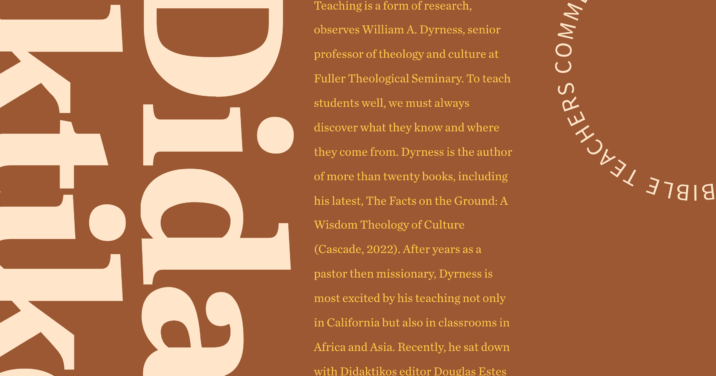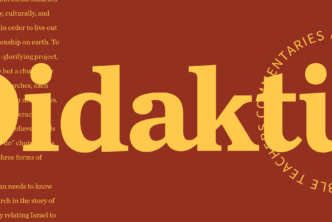An Example of Co-Teaching as a Means of Modeling Interdisciplinary Dialogue
Eric J. Tully | Trinity Evangelical Divinity School
One of the challenges in Christian higher education is navigating the tension between various fields of study. Christian institutions should have an inherent unity that comes from our faith and mission, but there is often a basic fragmentation that reflects the academic guilds in which we have been trained and now participate.
These disciplinary silos can be positive in that they allow for specialization, promote methodological rigor, and contribute unique ideas that are enriching and important. But the downsides are obvious: by “staying in our lane” we run the risk of blind spots and may develop an inability to interact with the questions and interests of other fields of study.
In many earlier periods of church history, scholars did not accept this kind of division of labor. The notion of a theologian who did not know Greek or Hebrew would have been repugnant to most of the Reformers. There are also pedagogical implications in an institution consisting of different academic departments. If two different disciplines have contrasting views on an issue, students tend to hear only one viewpoint in a given course. Therefore, as they go through the curriculum, they bounce back and forth between two different competing “tracks” and are asked to choose a side.
At Trinity Evangelical Divinity School, where I teach Old Testament and Hebrew, there is an ongoing, informal conversation concerning interpretation of the Old Testament. To greatly oversimplify: faculty in systematic theology tend to emphasize that an Old Testament passage should be intentionally interpreted in light of the whole canon (including the New Testament), whereas Old Testament faculty emphasize that a passage should be read first and primarily in its historical and literary context as the original, implied readers would have understood it. It is not a question of authority; it is a question of methodology. Both sides are trying to protect and preserve something important.
I have had many conversations about this issue with my friend and colleague David Luy, who teaches systematic theology at Trinity. Because we are friends, and because we do not agree, we decided to team-teach a course in which we could continue that conversation with students, using a specific book of the Bible as a test case. We chose the book of Psalms because it is a significant book for the church, is quoted frequently in the New Testament, and is the subject of abundant precritical exegesis.
Constructive conversation
Our plan was that both of us would participate in the class discussion the entire time, rather than dividing the sessions between us. In addition, we would join the students in completing each other’s assignments. We would each represent our own discipline and make a case for that perspective, but we would remain epistemologically open and seek to learn from the other. I would lead the class in contextual, historical-grammatical exegesis involving Hebrew language, poetry, the editing of the Psalter, and New Testament use of the Old Testament. David would lead the class in substantial readings of precritical exegesis (including Augustine, Theodoret, Cassiodorus, Luther) as well as contemporary voices (including Bonhoeffer), and he would help the class consider the use of Psalms in contemporary worship in the church.
We knew that students would have their own convictions about these matters and would contribute to the class in helpful ways. It would be an opportunity for all of us to challenge each other and either to adjust or solidify our views. As we began to promote the course, some students said they were hoping to see a “rumble” between two professors! But we quickly disabused them of that notion. Our goal was to model constructive and charitable dialogue.
We needed administrative support because of the financial implications of having two professors in one course and because, in teaching this interdisciplinary course, we would not be available for other upper-level electives in our respective fields. Fortunately, we found our administrators to be flexible and supportive of creative pedagogy, and they assisted us enthusiastically.
The course was open to all upper-level students, including MDiv students. While we assumed that we would draw students from both OT and theology, the course had a prerequisite of Hebrew Exegesis. At Trinity, we offer very few English Bible courses (studies of particular books are in Hebrew and Greek); therefore, to be truly interdisciplinary, the students needed both to work through the text in Hebrew and to engage in primary theological texts.
David and I selected nine psalms to study during the semester, and we allotted two weeks for each psalm (or a set of several related psalms). On the “A” weeks (the first week given to a psalm), we all prepared for class by going through the text in Hebrew, answering specific syntax and interpretive questions, reading technical commentaries, outlining the psalm’s poetic structure, and drawing conclusions about its meaning and intent. In class, under my leadership, we discussed the text in detail, raising questions and addressing difficulties. David and the theology students asked insightful questions about methodology and pushed us to think more deeply about theological implications. By the end of the first week, the students were very familiar with the psalm in Hebrew and had discussed the meaning of the psalm within its OT context. On the “B” weeks, we prepared for class by reading substantial portions of precritical interpreters on the same psalm as the previous week. David led the discussion, giving us all a grammar for reading these interpreters on their own terms and helping us appreciate their concerns and contributions.
Although we studied only nine psalms, our goal was not to maximize the coverage of material but to allow significant time for a thorough discussion on hermeneutics and theological discourse. Not only did we have plenty of time for discussion, but the two-week cycles also enabled us to have a two-way conversation. Our historical-grammatical exegesis informed our reading of the precritical interpreters, and they in turn raised questions and made observations we had not considered.
Interdisciplinary appreciation
At the end of the semester, we asked the students how the course had changed their thinking. They made helpful general observations about the distinct perspectives and methodologies of the two disciplines. For example, I and the OT students tended to focus on the human author (while assuming that the divine author was the source of inspiration). David and the theology students, by contrast, emphasized the divine author (who was at work in the human author). Also, those in theology tended to think from big picture to details, from canon to pericope. By contrast, those in Old Testament moved from details to big picture. In one conversation, David and the theology students laughed when I announced that I had checked all 127 occurrences of a particular Hebrew verb and its collocations. Similarly, I was impressed with the way David effortlessly produced visual maps of logical relationships on the whiteboard.
One student said he had come to appreciate the precritical exegetes and was more open to seeing Christ in the Old Testament than he had been before. Another student, pursuing an MA in Old Testament, was disappointed and unconvinced by Augustine’s interpretations, even though his devotional approach had been somewhat transformative for her. A PhD student in systematic theology remarked that he had first drunk deeply of historical-grammatical exegesis, then he had swung toward precritical approaches; this class had forced him to bring the two disciplines together. Finally, an MDiv student said the exegesis work in the “A” weeks made the reading in the “B” weeks a much more substantive experience than it would have been otherwise.
Neither David nor I experienced a paradigm shift. We still appreciate the distinctive contribution and emphases of our respective disciplines. But neither did our experience in the course harden our views. Rather, we both grew in appreciation for the other’s perspective. For David, the course deepened his commitment to the kinds of granular, detailed analysis one finds in Old Testament studies. Similarly, I have been challenged to ensure that I am relating the message of a pericope to the canon as a whole, and to always be looking for living theology.
Both of us are committed to avoiding the inevitable straw man arguments that come from disciplinary isolation. Interdisciplinary co-teaching and writing can foster greater epistemological openness and nuanced conversation, which is beneficial for us and for our students.
This article was originally published in Didaktikos: Journal of Theological Education. Subscriptions are available worldwide; click below for more information.

]]>





